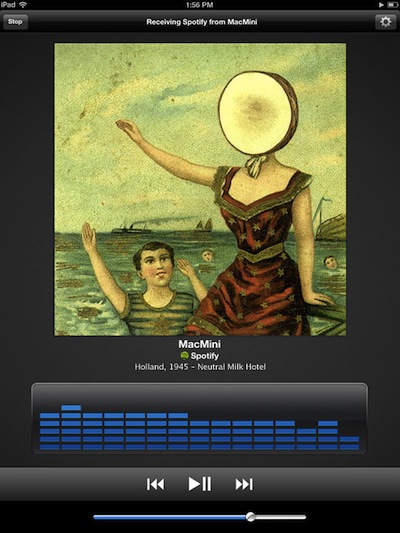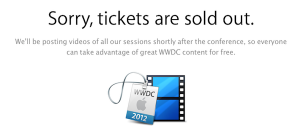April 28, 2012
Analytics firm comScore reports that Amazon.com’s Kindle Fire tablet increased its market share from 29.4 to 54.4 percent of the Android tablet market in two months, from December of 2011 through February of 2012. The Kindle Fire handily beat out Samsung’s Galaxy Tab family and Motorola’s Xoom for the top spot. comScore measures marketshare using tagged Web page content.
iPad-sized devices saw a “higher level of content consumption,” according to comScore’s analysis. Devices with 10-inch screens like the iPad saw an average of 125 browser page views per tablet, 39 percent higher consumption than seven-inch tablets and 58 percent higher consumption than five-inch tablets.
April 27, 2012
Written by Shawn King
 New York Times:
New York Times:
Hyman Strachman, a 92-year-old, 5-foot-5 World War II veteran trying to stay busy after the death of his wife. And he has sent every one of his copied DVDs, almost 4,000 boxes of them to date, free to American soldiers in Iraq and Afghanistan.“It’s not the right thing to do, but I did it,” Mr. Strachman said, acknowledging that his actions violated copyright law.
Go ahead, Hollywood. Just try to sue this guy.
Written by Peter Cohen
Don Reisinger for CNet:
Speaking to the Austin-based Statesman newspaper, Dave Porter, senior vice president for economic development at the Greater Austin Chamber of Commerce, said that the deal between the city and Apple is not done, and “remains in peril.” Porter went on to tell the newspaper that Apple is now “frustrated” with the recent developments.
Apple’s expansion of its Austin, Texas customer support operations was a big deal – the company plans to double its headcount and build new facilities. Texas governor Rick Perry has even mentioned it in speeches as an example of how Texas provides a business-friendly environment to big companies.
Some of the loudest noise opposing Apple’s deal with Austin is attorney and former judge Bill Aleshire, who called it a “sorry contract” and suggested that Apple had “rigged” the process in its own favor.
Written by Peter Cohen
Om Malik for GigaOM:
Apple acquired app discovery service Chomp earlier this year, betting that it would help make app discovery easier and better on its iTunes Appstore. The casualty of that acquisition is the Chomp for Android app which seems to have been discontinued.
So far Apple has, in standard fashion, kept quiet about its long-term plans for Chomp. But clearly Android isn’t part of Chomp’s future anymore.
Written by Peter Cohen
George Colony on Forrester Blogs:
When Steve Jobs departed, he took three things with him: 1) singular charismatic leadership that bound the company together and elicited extraordinary performance from its people; 2) the ability to take big risks, and 3) an unparalleled ability to envision and design products. Apple’s momentum will carry it for 24-48 months. But without the arrival of a new charismatic leader it will move from being a great company to being a good company, with a commensurate step down in revenue growth and product innovation. Like Sony (post Morita), Polaroid (post Land), Apple circa 1985 (post Jobs), and Disney (in the 20 years post Walt Disney), Apple will coast, and then decelerate.
Didn’t we hear this same crap when Jobs retired last year, and again after he died?
Does anyone really think that Cook et al are just riding Jobs’ coattails still, as they’re setting records for growth and profitability?
I look forward to 2014-2016, when Forrester CEO George Colony will be lauded as a visionary – the only one who really understood that beleaguered Apple was doomed from the start!
No, wait a minute, no he won’t. He’ll be ignored. Unlike people with a plan and the ability to execute it. Like, say, Tim Cook.
Written by Peter Cohen
Apple has had a planning request approved for a new off-campus restaurant by the Cupertino Planning Commission, providing employees with a place to eat and discuss company plans and product development without fear of Apple’s competitors overhearing conversations.The new 21,468-square-foot cafeteria, which was approved at a meeting on Tuesday, is located a short walk from Apple’s Infinite Loop headquarters and will provide cafe, meeting room, lounge areas and courtyard facilities, as well as a dedicated second floor for restaurant staff.
Loose lips sink ships.
I wonder if this will do anything to help prevent iPhone prototypes from being left in bars.
Written by Jim Dalrymple
Many thanks to ScreenCastsOnline for sponsoring The Loop this week.
Established in 2005, ScreenCastsOnline is acknowledged as one of the primary online training resources for the Mac and iOS, publishing two brand new video tutorials each and every week.
ScreenCastsOnline members automatically receive a new Mac or iOS video tutorial (or both) each week, as well as access to a huge video library of over 340 Mac tutorials and 50 iOS tutorials, covering the latest Apple and third party software.
Special offer for all “The Loop” readers – 20% discount off the first payment for any monthly, quarterly or annual membership.
More recently, ScreenCastsOnline has launched a number of low cost tutorial apps in both the Mac and iTunes App Stores.
SCOtutor for Lion – For Mac users upgrading to Lion SCOtutor for Mac – For new Mac users wanting to learn about the Mac from scratch. SCOtutor for iPad – For new iPad users – all about the iPad and iOS from first principles. SCOtutor for iPhoto on iOS – Learn all about the new iPhoto app for the iPad and iPhone.
All SCOtutor apps include an optimised video player, full chapter navigation, English subtitles and many other unique features. All apps are available on both the Mac and iOS devices.
More information about the special ScreenCastsOnline membership discount or the SCOtutor tutorials apps is available on the Web site.
Written by Jim Dalrymple
Andrew Scheps’ engineering and mixing credits read like a who’s who of popular music. He mixed four tracks on Adele’s Grammy-winning album, 21, and engineered and mixed 11 songs on the latest Red Hot Chili Peppers album, I’m with You. The latter was one of his many collaborations with production legend Rick Rubin. Scheps has also worked with Jay-Z, U2, Justin Timberlake, Green Day, Metallica, and many others. As a producer, Scheps’ credits include bands such as Favez, The Duke Spirit, and Audrye Sessions.
It’s always interesting to see how the pros do it.
Written by Jim Dalrymple
The iPad is drawing new consumers to the Apple brand with more than one-in-four iPad owners saying the device is their first Apple product. According to leading market research company, The NPD Group’s recent Apple Ecosystem Study, 33 percent of U.S. homes, (37 million households) own Apple products. While a majority (69 percent) of these consumers own iPods, ownership of iPads is growing.
This is good news for Apple. It doesn’t matter if it’s a Mac, iPhone or iPad that draws people to Apple, once they start using the product they will buy more. The simplicity of using any Apple products will win people over.
Written by Jim Dalrymple
The Q1 findings showed that Apple’s iPhone 4S hit a record high, claiming the number one device spot overall, with 37 percent of all activations for the first quarter (four times that of any other device). The iPad 2 claimed the second spot overall, with 17.7 percent of activations for the quarter. With less than one month on the market, the new iPad™, released in March 2012, rocketed to the number four spot with 4.3 percent of all activations for the quarter, and an impressive 12.1 percent of activations in March alone.Good found that iPads collectively represented roughly 97.3 percent of its tablet activations for Q1 2012. Apple’s continued growth is not only being driven by consumers and the overall BYOD trend, but also by proactive enterprise deployment of iPads.
We knew Apple was doing really good in the consumer market, but this is quite impressive.
Written by Jim Dalrymple
Image editing software Pixelmator has been updated to version 2.0.3 with the following improvements:
- Improves the performance of the Move Tool
- Fixes memory leaks
- Fixes a situation where performance would degrade over time
- Fixes issues with Export for Web
- Fixes a problem that caused corrupt PXM files
April 26, 2012
Written by Jim Dalrymple
Taylor Wimberly:
We know Samsung has an unhealthy obsession with Apple, but this is getting a little weird. This week in Australia, Samsung hired a marketing agency called Tongue to conduct some kind of guerrilla marketing campaign where they sent a bus of protesters to an Apple store and taunted people with the message “WAKE UP.”
Here’s an idea: just make products that don’t copy everything Apple does.
April 25, 2012
Written by Shawn King
The Verge:
The Google Drive cloud storage service launched yesterday to much fanfare, but as with any new Google product, there are important questions about how the company will actually use personal data uploaded to the system. Google sells ads against your data, after all, and the more data you give the company, the more opportunity it has to screw up. That means the Google Drive terms of service and privacy policy are critically important, and there’s been a lot of selective interpretation floating around the web in the past 24 hours — and a lot of comparisons to the privacy policies of competitive services like Dropbox and Microsoft’s SkyDrive.That’s great — all web services should be subject to harsh scrutiny of their privacy policies — but a close and careful reading reveals that Google’s terms are pretty much the same as anyone else’s, and slightly better in some cases. Let’s take a look.
You might be surprised to see the answer.
Written by Shawn King
CNET:
Sprint Nextel is banking that its unlimited data plan will continue to set its iPhone apart from the others — even when the next version arrives.If the next iteration of the iPhone arrives with LTE, Sprint will continue to offer a no-strings unlimited plan, CEO Dan Hesse told CNET.Hesse believes the decision to stick with unlimited has been a boon for the company, drawing in new customers who wouldn’t have otherwise considered the carrier.
He may very well be right. My next iPhone might be one from Sprint.
Rogue Amoeba on Wednesday released Airfoil Speakers Touch version 3, a new version of their iOS audio app. It’s available as a free download from the iOS App Store, and works in conjunction with Rogue Amoeba’s Airfoil for Mac OS X or Windows apps.
Airfoil Speakers Touch now lets you stream audio to any iPhone, iPod touch or iPad by making it an AirPlay-compatible receiver. AirPlay is Apple’s term for its streaming music technology supported by speaker docs, AV receivers and other devices.

The software works independently of Airfoil for desktop computers, allowing you to send audio to iOS devices from iTunes. But if Airfoil is installed, you can synchronize audio from other apps, such as Spotify and Rdio, or stream music from Web services like Pandora and Last.fm.
The software has also been updated with native iPad interface support.
If you’re an Apple developer and you haven’t already snagged a ticket for this year’s WWDC, better luck next year: Apple has updated its WWDC Web site with an indication that tickets for this year’s event are no longer available – they’re sold out (in record time).

Written by Peter Cohen
Laura Hazard Owen for paidContent:
Macmillan science fiction/fantasy imprint Tor/Forge — the publisher of titles like Orson Scott Card’s “Ender’s Game” — will sell its e-books DRM-free as of “early July 2012,” the company announced today.
This is great news for fantasy and science fiction enthusiasts who want to buy content unencumbered with restrictions on how it can interact with devices or apps – a very real problem when buying ebooks from Amazon.com, Barnes and Noble or even through Apple’s iBooks.
Tor publishes books from Orson Scott Card, Whitley Strieber, Robert Jordan, John Scalzi and many others.
Written by Peter Cohen
Don Reisinger for Cnet:
As one might expect, Apple’s iPhone proved quite popular on Sprint’s service, with 1.5 million of those devices activated during the first quarter. According to Sprint, 44 percent of those activations went to new customers.
With 4.3 million phones activated on AT&T and about 3 million activated by Verizon, Sprint is by far the smallest iPhone reseller of the major US carriers. Forty-four percent of those iPhone activations on Sprint’s network went to new customers, though, which must make the company’s executives pretty happy.
Apple has announced the date for this year’s WWDC: June 11 through June 15. It once again returns to the Moscone West facility in San Francisco. Tickets cost $1,599. You need to be a registered iOS or Mac OS developer in order to attend.
Apple has planned more than 100 technical sessions, and will offer attendees 100 hands-on labs staffed by Apple engineers. Other events include the Apple Design Awards, which recognize iOS and Mac apps, lunchtime sessions and more.
In a statement, Apple’s senior vice president of Worldwide Marketing explained that this year’s WWDC would focus on both iOS and OS X Mountain Lion, the newest version of the Mac operating system that will be released later this year. “The iOS platform has created an entirely new industry with fantastic opportunities for developers across the country and around the world,” said Schiller.
One change from last year that may stop some developers at larger companies from attending the show: Apple is restricting the sale of tickets to one per person and five per organization.
Written by Peter Cohen
Sophos’ Naked Security blog:
One in every five Mac computers is harbouring some kind of malware, a new study from the experts at Sophos has revealed.
The key phrase here is “some kind of malware.” Sophos is including Windows malware, sent to you by e-mail, for example, by unwitting Windows users. That stuff will never give OS X a problem.
How many times have you received a spam e-mail or message from a Windows using friend (or total stranger) with a strange file attachment?
Get rid of it, obviously, but you’re using a Mac for a reason – and one of them may be so you don’t have to deal with Windows and its problems.
What’s more, Sophos’ thesis is predicated on assumptions made using data retrieved from “Mac computers which have recently downloaded Sophos’s free Mac anti-virus software.” Mac users who have downloaded anti-virus software are a self-selecting group if ever I heard one. One in five of those Macs may have some kind of malware on them, but I’d be very surprised if that was the same as the public at large.
Mac users don’t routinely use anti-virus software. I expect that many of them are downloading Sophos’ product with the expectation that they’re going to find problems.
Sophos is simply trying to drum up interest in its own products – the blog post links back to its anti-virus software for Mac, which is indeed free, but is also quite capable of building a captive audience for other products in the future.
Apple announced $11.6 billion in profits on $39.2 billion in revenue on Tuesday, compared to profit and revenue of $6.0 billion and $24.7 billion, respectively, for the same quarter a year ago. That figures to diluted earnings per share of $12.30.
Apple reports 35.1 million iPhones sold in the quarter, 88 percent growth compared to last year. 11.8 million iPads were sold, a 151 percent increase over the same quarter a year ago. Four million Macs were sold, a more mild 7 percent increase, and 7.7 million iPods were sold, continuing the regular decline we’ve seen of iPod unit sales, down 15 percent year-over-year.
Peter Oppenheimer, Apple’s CFO, said that Apple anticipates revenue of $34 billion and diluted earnings per share (EPS) of about $8.68.
Apple once again handily beat Wall Street analysts’ estimates, which pegged last quarter’s revenue and profits lower. Analysts seemed to have underestimated demand for iPhones, Macs and iPads, as well.
Written by Peter Cohen
Susan Decker for Bloomberg:
Motorola Mobility Holdings Inc. (MMI) won a partial U.S. International Trade Commission judge’s ruling in its bid to block imports of Apple Inc. (AAPL)’s devices including the iPhone and iPad tablet computer. ITC Judge Thomas Pender said Apple violated one of four Motorola Mobility patent rights. The patent relates to Wi-Fi technology. The judge’s findings are subject to review by the six-member commission, which has the power to block imports that infringe U.S. patents.
Two of the patents concern Wi-Fi; one involves how the phone senses if it’s close to the user’s head, and the last one describes the way the server tracks application availability.
Written by Peter Cohen
Sean Gallagher for Ars Technica:
The low headcount and the urgency of just about every project—where the millions spent on a grant for a particular project may be lost if data can’t be collected or transmitted—demands that the few IT pros on hand in Antarctica have not just depth of knowledge, but skills across other fields as well. “Typically, they’re at an engineer level as opposed to a technician,” Gitt says. “They could fix almost anything.” One technician had to diagnose a problem with the Windows software package needed for a project on a researcher’s laptop—and the program was written and documented in French.
I never really thought of IT as an “extreme” profession, but for these folks, it definitely is.
Written by Jim Dalrymple
An alternate view on clicky keyboards.
Written by Jim Dalrymple
Shawn Blanc has a very detailed review of his favorite clicky keyboards, including sound recordings of the sound they make when you type. I found the words-per-minute and accuracy were particularly interesting.
April 23, 2012
Written by Jim Dalrymple
Dan Farber:
In 2006 email thread, Rubin said that Sun owned the intellectual property and brand for Java and that the Java.lang APIs were copyrighted. Over the next several years his thinking changed.
Your thinking may change, but the truth remains constant.




